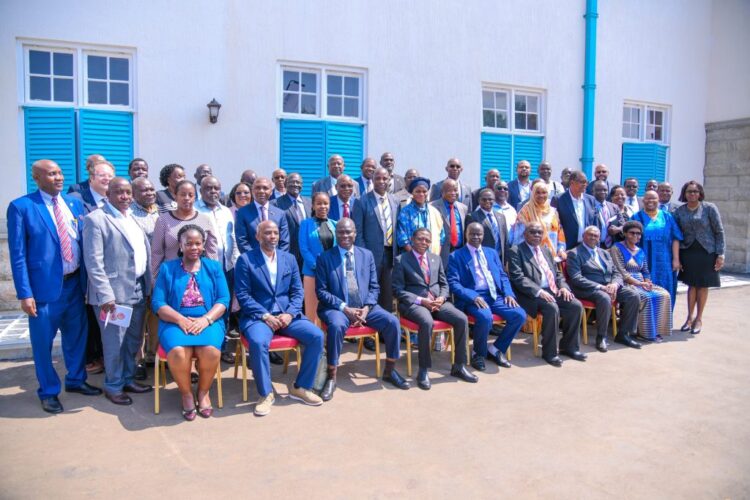The Uganda Vice Chancellors Forum (UVCF) has made a compelling case for the scientific evaluation and continued support of the Higher Education Access Certificate (HEAC) programme, as uncertainty looms over its future. This appeal was made during an extraordinary sitting of the UVCF held on June 23, 2025, at the Senior Common Room, Makerere University.
Hosted by Acting Vice Chancellor Prof. Buyinza Mukadasi, the meeting brought together senior figures from Uganda’s higher education landscape, including Executive Director of UVCF Prof. Eriabu Lugujjo, Chairperson UVCF and Busitema University Vice Chancellor Prof. Paul Waako, and officials from the National Council for Higher Education (NCHE) led by Dr. Maria Nakachwa. Also in attendance were representatives of the HEAC programme and beneficiaries, including students.
Welcoming the delegates, Prof. Buyinza conveyed greetings from Makerere’s Vice Chancellor, Prof. Barnabas Nawangwe, who was away on official duty. He acknowledged the urgency of the sitting, stating, “I find the proposed items on the order paper quite pertinent given the time, as we offer guidance and input towards our next journey in higher education.”
He expressed optimism that the meeting would culminate in a unified stance. “We believe that by the close of the day, we should be able to come up with a position paper that will inform the next course of action in this regard,” he said.
Prof. Lugujjo, in his remarks, thanked Makerere University for hosting the meeting at short notice. He took a moment to commend the quality of restoration work on the university’s iconic Main Building, gutted by fire in 2020. “Ninety percent of the Vice Chancellors gathered today had not been here since the conflagration, so we wish to commend you on the quality of work, especially the preservation of history,” he said.
He joined Prof. Buyinza in underscoring the importance of reaching consensus on the future of the HEAC programme and other pressing higher education matters.
Chairperson UVCF Prof. Paul Waako opened his remarks by thanking Africa Renewal University for its hospitality during the Forum’s 75th meeting and congratulated universities for their participation in the 2025 National Science Week and Science Summit.
“This is a very good forum for institutions to interact, share progress on innovations and catch up with how far the country is progressing in science, technology and innovation,” Prof. Waako said. He added that the Science Summit, a new addition this year, is expected to culminate in a position paper on science and innovation to be presented to Cabinet annually.
Prof. Waako stressed the significance of the day’s extraordinary sitting. “This meeting has been called on short notice to feed into ongoing discussions at high levels regarding the HEAC programme and the recently passed Uganda Technical and Vocational Education and Training (TVET) Act, 2025,” he said.
He emphasized that the TVET Act bears serious implications on diploma and certificate-level higher education, necessitating input from the nation’s Vice Chancellors.
The meeting also welcomed stakeholders from the Ministry of Education and Sports, along with Prof. David Orema—who helped develop the HEAC programme—and student beneficiaries including Alex Opio Ongom, incoming Guild President of Gulu University, and Kabale University’s student representative. The first female graduate engineer from Buyende District, also a HEAC beneficiary, was present.
In her detailed overview of the programme, Dr. Nakachwa from NCHE highlighted Uganda’s unique role in the region. “Uganda remains a hub of Higher Education in the region, and the programme acts as a good bridge for international students who need to meet entry requirements of Ugandan institutions,” she said.
She emphasized the programme’s local significance, particularly for students who have completed UACE but failed to meet minimum diploma or degree requirements. “Looking at the recently released UNEB exams, people with one principal pass were 29,000. Where are they going? Are they going to repeat? Very few do. In 2023, 18,000 students got one principal pass. Should we deny them access to the Ugandan Higher Education?” she asked.
Dr. Nakachwa explained that the HEAC programme is grounded in policy and was approved by NCHE in 2016 under Instrument 34 of 2008, qualifying as a Level 4 credential on the Uganda Qualifications Framework. Institutions are allowed to tailor the programme by adding two or three courses to aid student readiness for higher education.
She outlined the programme’s four target groups: foreign students with differing academic systems, Ugandan students with insufficient UACE results, vocational qualification holders seeking to upgrade, and learners crossing the science-arts divide in pursuit of clinical or nursing programmes.
Dr. Nakachwa also elaborated on the 2022 programme review that led to a rebranding from Higher Education Certificate (HEC) to HEAC and an expansion of science course content. The programme now runs three tracks—Biological Sciences, Physical Sciences, and a General track for arts students—complemented by shared courses in Life Skills, Study Skills and Academic Writing, and Foundations of Mathematics and Statistics.
As of December 2024, she reported, 21 out of 56 registered Higher Education Institutions are accredited to offer HEAC, with an enrollment of 3,908 students. “We have learnt some lessons which include; having the regulatory frameworks reviewed is critical, and continuous engagement with stakeholders is paramount,” she concluded.
Following the presentation, the forum held intensive discussions anchored on NCHE’s data and insights. The sitting resolved to develop a position paper on the HEAC programme, aimed at informing high-level policy decisions.
The day ended with a guided tour of Makerere University’s newly restored Main Building, led by Prof. Buyinza, offering a symbolic close to a meeting dedicated to bridging gaps in Uganda’s higher education landscape.



















Discussion about this post